The German advance into Russia continued, with German troops occupying Riga on 1 July; by the end of the week they had reached the Dnieper River and Stalin had ordered a “scorched earth” policy. A number of atrocities were committed by German troops: Soviet prisoners of war were executed, and scientists and writers in the captured Polish city of Lvov were rounded up and killed; Jews in Vilnius were made to do forced labour and then executed. In the Western Desert, General Auchinleck replaced General Wavell in charge of the British army.
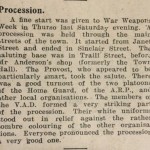 Meanwhile in Caithness the John O’Groat Journal reported that War Weapons Week had exceeded its target of £100,000. Thurso’s events began with a procession through the town, starting from Janet Street and ending in Sinclair Street; “The Provost, who appeared to be particularly smart, took the salute”.
Meanwhile in Caithness the John O’Groat Journal reported that War Weapons Week had exceeded its target of £100,000. Thurso’s events began with a procession through the town, starting from Janet Street and ending in Sinclair Street; “The Provost, who appeared to be particularly smart, took the salute”.
 Wick began its programme on Monday with “an open-air display of dancing and gymnastics at
Wick began its programme on Monday with “an open-air display of dancing and gymnastics at 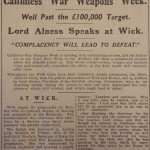 the Riverside. The entertainment was enlivened with selections by a Service pipe band whose presence was greatly appreciated.”
the Riverside. The entertainment was enlivened with selections by a Service pipe band whose presence was greatly appreciated.”
Schools across Caithness were breaking up for the summer holidays. The head teacher of Dunnet Public School recorded in the log book: “3 July. To-day was 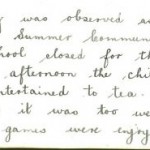 observed as a holiday owing to the Summer Communion Services. 4 July. The
observed as a holiday owing to the Summer Communion Services. 4 July. The 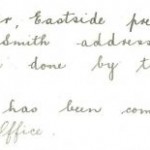 school closed for the Summer Vacation. In the afternoon the children and friends were entertained to tea. Mr Moir presided and as it was too wet to hold sports outside, games were enjoyed in the class-room. Mrs Calder, Eastside, presented the prizes and Mr Smith addressed the children. Needlework done by the girls was on display.”
school closed for the Summer Vacation. In the afternoon the children and friends were entertained to tea. Mr Moir presided and as it was too wet to hold sports outside, games were enjoyed in the class-room. Mrs Calder, Eastside, presented the prizes and Mr Smith addressed the children. Needlework done by the girls was on display.”
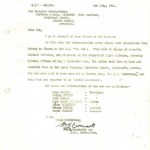 Another group of foreign nationals were landed at Thurso this week, from Orkney on board the SS Ola. Interestingly, because the men were Norwegian, Danish, Swedish and Russian (i.e., from nations currently hostile to Britain) they were escorted by “Security Control Officers” and police all the way to London: “The men were said to have come off a Finnish ship, the S.S. Rolfsberg, but they are not reported to be “marine survivors”.”
Another group of foreign nationals were landed at Thurso this week, from Orkney on board the SS Ola. Interestingly, because the men were Norwegian, Danish, Swedish and Russian (i.e., from nations currently hostile to Britain) they were escorted by “Security Control Officers” and police all the way to London: “The men were said to have come off a Finnish ship, the S.S. Rolfsberg, but they are not reported to be “marine survivors”.”
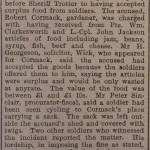 Finally this week, the John O’Groat Journal reported the case of a civilian who was fined £3 3s. for receiving surplus food from soldiers. The man, Robert Cormack, a gardener, was approached by the soldiers and offered “articles of food including jam, beans, syrup, fish, beef and cheese.” In his defence it was pointed out that the articles of food “were surplus, and would only be wasted at any rate”. The Sheriff seemed to be sympathetic but had to apply the law: “His lordship … said that apparently the food was surplus, but Cormack had pleaded guilty to the offence, and a penalty had to be imposed as provided by the Statute.”
Finally this week, the John O’Groat Journal reported the case of a civilian who was fined £3 3s. for receiving surplus food from soldiers. The man, Robert Cormack, a gardener, was approached by the soldiers and offered “articles of food including jam, beans, syrup, fish, beef and cheese.” In his defence it was pointed out that the articles of food “were surplus, and would only be wasted at any rate”. The Sheriff seemed to be sympathetic but had to apply the law: “His lordship … said that apparently the food was surplus, but Cormack had pleaded guilty to the offence, and a penalty had to be imposed as provided by the Statute.”
